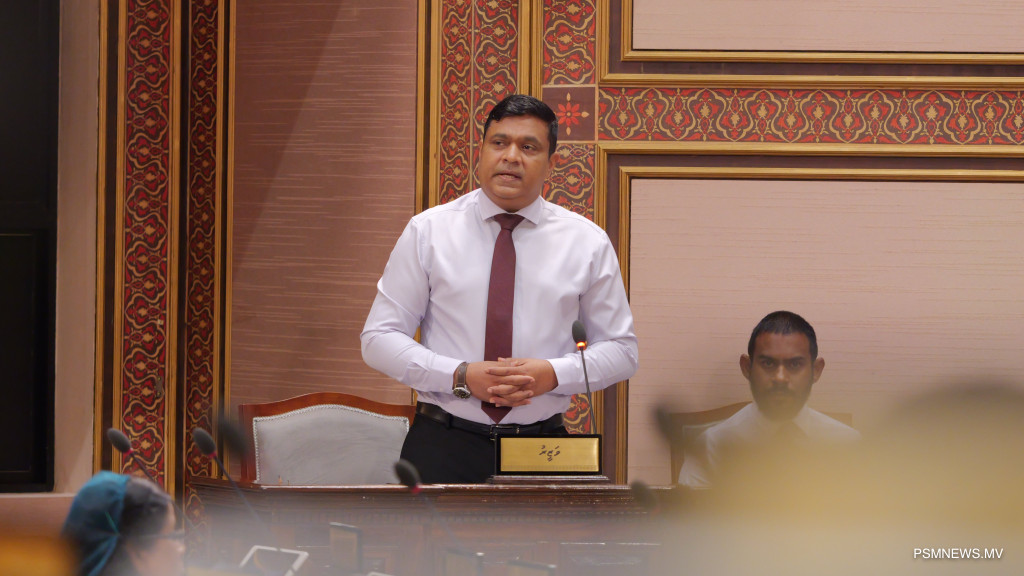Helicopter Tender to Relaunch in November, Minister Ameen Confirms Industry Objections Prompted Revision

The government will revise its tender for the introduction of helicopter services and reopen the bidding process in November, following objections from aviation firms over mandatory humanitarian aid provisions, according to Minister of Transport and Civil Aviation Mohamed Ameen.
The announcement was made in response to questions from Mohamed Ibrahim, Member of Parliament for North Galolhu, who sought clarification on the delay of the service, originally scheduled to commence in March, and details regarding the company awarded the contract.
Minister Ameen explained that the initial Request for Proposal (RFP) was designed to maximise public benefit. Under the original terms, operators were required to allocate a portion of their services, free of charge, to the government for critical functions such as medical evacuations and rescue operations.
“The government did not want the matter to revolve solely around the collection of service tariffs. Instead, we assessed how the state could derive the maximum possible benefit from the arrangement,” Minister Ameen said.
He added, “Consequently, the requirement for providing mandatory free assistance for medical and rescue operations was incorporated into the conditions. However, after companies indicated that the scope of this commitment was too extensive, the previous RFP [Request for Proposal] has now been legally annulled.”
Although the initial tender attracted interest from 36 companies, subsequent consultations revealed widespread concern over the scale of the humanitarian obligations. Minister Ameen confirmed that the government had annulled the original proposal and would re-establish the standards for a revised tender.

“Drawing upon our previous experience, we will implement manageable modifications to the RFP. I am highly confident that we can launch the process before December and ensure its successful conclusion within a year,” he said.
Safety remains a central consideration in the government’s planning. Minister Ameen acknowledged that three fatal incidents occurred 25 years ago when helicopter services were previously operational in the country, a history that continues to fuel public apprehension.
To address these concerns, the government commissioned a study referencing civil aviation standards in the United States, which officials described as the global benchmark. The study concluded that certain types of helicopter services could be safely operated within the Maldives. The minister affirmed that both the study and the final service framework would align with international aviation safety protocols.
The government anticipates that the revised helicopter service will serve dual strategic purposes: strengthening the tourism sector and enhancing the nation’s capacity for humanitarian response.
Transport ministry cites corrosion risks in deferral of electric taxi programme
Minister Ameen also confirmed during the parliamentary session that the government’s plan to introduce a state-operated electric taxi service has been delayed due to technical complications arising from the country’s maritime climate.
Initially scheduled for launch in August, the service is now expected to commence by the end of January. The postponement reflects the need for extensive modifications to the electric vehicles (EVs) selected for the fleet, which must be adapted to withstand the corrosive effects of salt exposure in the Maldives.
“As these are EVs [electric vehicles], various issues can arise if they are not suited to the local environment,” Minister Ameen stated. “In the Maldives, the corrosive effect of salt exposure is significant. Therefore, considering this factor, we are implementing necessary modifications to the vehicles.”
The initiative is designed to address persistent public difficulties in securing taxis, with the aim of transforming the service into a dependable and accessible public resource. A fully environmentally friendly fleet lies at the heart of this effort.

Salt corrosion, a consequence of the city’s proximity to the sea, presents a significant engineering challenge. Minister Ameen noted that manufacturers had cautioned against deploying standard EV models without climate-specific adaptations. “This is the reason for the current delays. Nevertheless, the service will commence by the end of this year or during the month of January,” he said.
To mitigate these risks, the vehicles are undergoing targeted modifications. Production of the adjusted models is currently underway, and this process accounts for the delay, the minister added.
Responsibility for implementing the service has been assigned to the Maldives Transport and Contracting Company (MTCC). Minister Ameen indicated that preparations are progressing, with expectations to import the vehicles and initiate operations within the next three months.
Once operational, the taxi line will offer 24-hour service, deploying three sizes of EVs to accommodate varying passenger needs. The staffing plan includes both permanent and part-time drivers.
